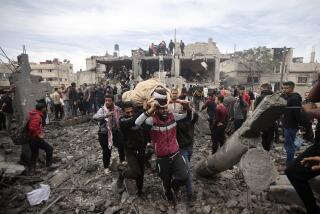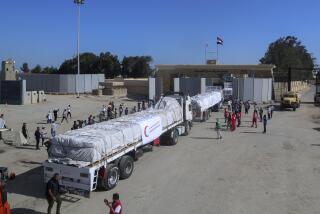Few Sri Lankans Clamor for Organic Bath Gel
- Share via
GALLE, Sri Lanka — In one of the largest relief efforts in history, a new issue is cropping up: mismatched aid.
Relief groups have opened boxes meant for tsunami survivors to discover coats sent by donors who were apparently unaware that the island nation is in the tropics, as well as polyester shirts and pants, which don’t absorb sweat, and fleece baby clothes.
“They’d melt to death,” said Pam Porodo, co-founder of Impakt Aid, a recently formed independent group working out of Colombo.
Westerners touched by the suffering also have sent food, generously emptying their larders of items that might be standard fare back home but don’t quite work locally.
Canned mixed vegetables in cream sauce is one example. First of all, most people here don’t have a can opener. Also, people here eat their vegetables fresh, and most don’t like the taste of creamed or canned food or may well get sick from it.
“The Sri Lankans can be very stubborn about what they eat, even if they go hungry,” said Michelle Cornman, 28, a special education teacher helping with relief efforts. “And the wrong foods disrupt their system.”
Sri Lankans and local charity groups say they are tremendously grateful for the global outpouring of support. A growing number of communities are no longer short of basics.
For example, at the relatively remote Ottusuttan refugee camp in the nation’s northeast, several hours from the nearest paved road, more than 300 displaced people are receiving three meals and two snacks a day.
At several camps in the south, including the Wijitharama Buddhist temple in Dewata, children have begun using huge piles of donated clothes as unofficial playgrounds.
With getting the essentials becoming less of a worry, it is increasingly clear that what tsunami victims are receiving does not always represent the most effective use of resources.
Some of this is inevitable, humanitarian groups say, given the gap in culture and the distance between well-intentioned donors in wealthy countries and impoverished refugees at the disaster site.
Aid shipments have included items that are not only extravagant by local standards, including luxe organic bath gels and body lotions, but so culturally foreign as to be unusable to Sri Lankans who have lost everything.
Even some items that hit the mark are viewed with mixed emotions by those working in the trenches. Designer children’s shirts with their $40 price tags still attached, or boxes of flip-flops that cost $25 in postage to send are certainly useful. Yet that amount of money spent locally could buy 20 to 30 times as many items, in styles the people here prefer, and help rebuild the economy.
Mismatches extend to temporary housing. The Netherlands immediately sent 1,200 14-foot-tall tents made of heavy canvas. The problem is that they’re too big. Most people want to live on the site of their ruined houses, which are small and often still filled with rubble.
“It’s a bit of a shame,” said Olof van Joolen, a Rotterdam-based reporter with the newspaper Algemeen Dagblad who was tracking Dutch relief efforts. “They’re sitting unused in a warehouse in Colombo.”
Over the last two weeks, more than 160 international flights have brought 2,400 tons of rice, 700 tons of lentils, 750 tons of wheat flour and 4 tons of canned fish, among other provisions. Much more aid is in the pipeline.
In the grand scheme of things, the mismatches are minor inconveniences in a campaign to ensure that people get enough food and have roofs over their heads. But they represent missed opportunities.
Sometimes it’s a case of what isn’t being sent, rather than what is. Global donors faced with such a crisis immediately think about food, water and shelter. But few think to send such items as women’s sanitary products. The Impakt group, however, canvassed five major distributors across the country, and none had any available.
For women having their period and trying to cope with so many other things, it’s a huge problem, locals and women aid workers say.
Not only are there severe shortages, but most of the camps are run by men. And in Sri Lankan culture, women rarely speak openly among themselves about the subject, let alone to men.
“Women are shy, even in the store, to ask for such things,” said Malage Patmini, 42, a resident of Unawatuna Beach Road who lost six relatives in the tsunami. “A couple of days after the storm, I had my period and sent my daughter looking. She had to go to a store two hours each way to find some. There are almost none left anywhere.”
Sithmini Perera, a Sri Lankan woman working for the civic group World Vision, said that when she visits refugee camps, she’s often mobbed by women who take her aside and ask her to raise the issue because they’re too embarrassed.
The tsunami displaced hundreds of thousands of people and disrupted women’s traditional hygiene methods.
With men around all the time, it’s difficult to employ familiar methods, which include burning used cloth or otherwise disposing of waste, amid the tight living conditions and lack of privacy.
“We’re seeing a lot of women’s problems,” said Belinda Ratnavira, a Westerner living in Sri Lanka who has been volunteering since the beginning of the crisis. “In these conditions, things women might do on a regular basis to keep clean, now they can’t. There’s also a big lack of understanding on why you need to.”
A few aid groups have started distributing packets of items for women. But local women don’t always know how to use foreign sanitary products, requiring special instructions. Nor do they always have the right garments. Some groups are now including underwear in the packets as well.
But most workers say a desperate shortage of such items persists. “If there was even a small tent to help women, all you’d need to do is tell one woman and there would be a line several blocks long,” said Malskaer Lispegh, a Dane who lives in Unawatuna.
“There’s a real organization problem with all this aid. People send the wrong things, which just end up in some big storeroom, or they fail to send the right things.”
More to Read
Sign up for Essential California
The most important California stories and recommendations in your inbox every morning.
You may occasionally receive promotional content from the Los Angeles Times.













